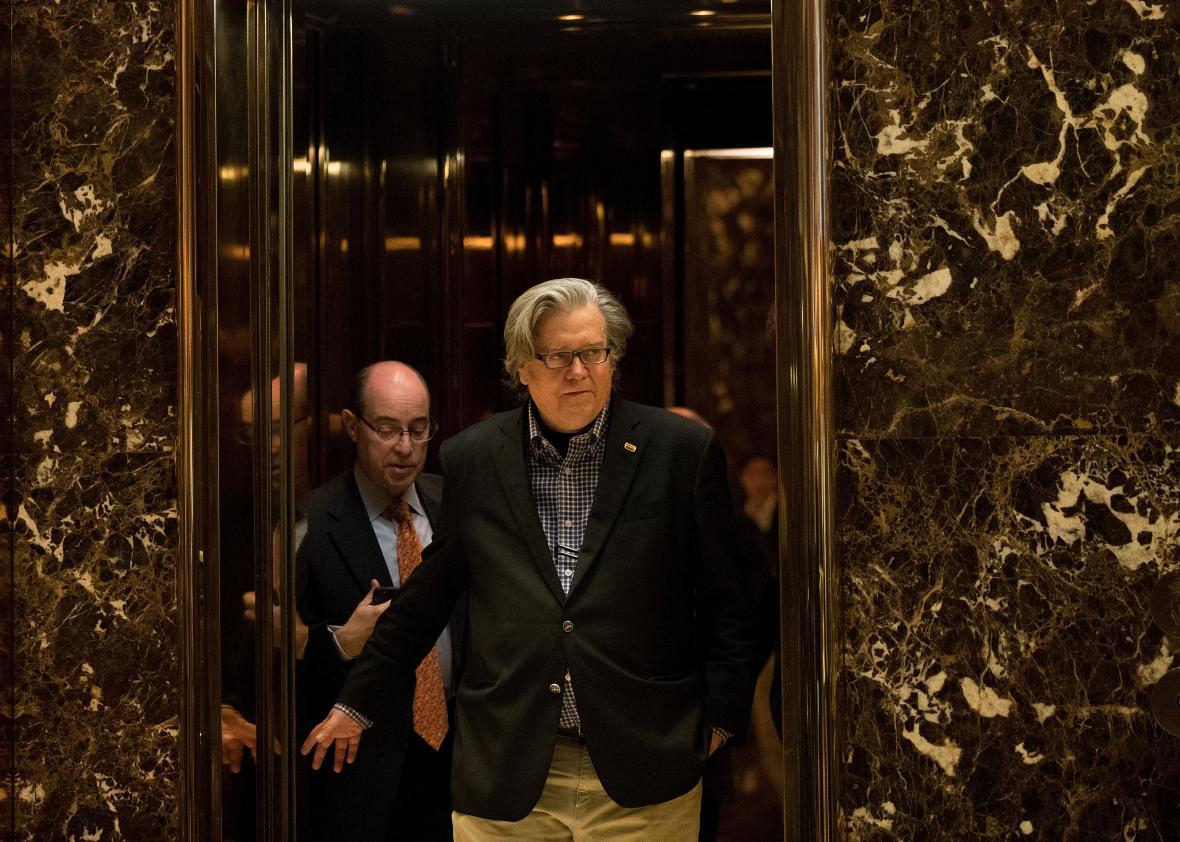When Karl Rove entered the White House as George W. Bush’s political mastermind, it was often said that he dreamed of nothing less than forming a “permanent Republican Majority.” His real ambitions might have been slightly more modest—“there are no permanent majorities in American politics,” he once told Tim Russert. “They last for about 20 or 30 or 40 or, in the case of the Roosevelt coalition, 50 or 60 years, and then they disappear.” But he clearly hoped to build a durable conservative bloc that would dominate national elections decades into the future.
That dream died a hard death in 2008, when Barack Obama won the presidency, a watershed moment that in turn led many liberals to believe that the country’s changing demographics might give their party a lasting grip on the White House.
Their dream died a hard death this month, when Donald Trump won the presidency.
Which brings us to Steve Bannon, Trump’s senior advisor—this new administration’s own Karl Rove, who helped make Breitbart the home cesspool of the racist, sexist alt-right, and whose appointment to the White House has been celebrated by the KKK and the American Nazi Party. Like those who came before him, Bannon appears to have his own ideas about a lasting Republican majority, which he explained in an interview with Michael Wolff for the Hollywood Reporter.
“I’m not a white nationalist, I’m a nationalist. I’m an economic nationalist,” he told Wolff, not all too convincingly. “The globalists gutted the American working class and created a middle class in Asia. The issue now is about Americans looking to not get fucked over. If we deliver—we’ll get 60 percent of the white vote, and 40 percent of the black and Hispanic vote and we’ll govern for 50 years.”
This is not entirely surprising stuff. Trump spent an entire campaign accusing “globalists” of selling out American workers with trade deals that shipped jobs to Mexico and China, after all. He spoke about an “America first” economic policy. But it’s always hard to tell how sincere the president-elect is about his applause lines on the stump, or whether he even faintly grasps the issues underlying them, which has led many to wonder how hard he’ll actually try to deliver on his promises, and how much he’ll just leave to Congress.
Bannon, on the other hand, talks like he has a vision, one that he truly believes can realign this country’s politics. Sure, it’s a bit rich to go on about creating an alliance that can govern for half a century when your candidate couldn’t even win a plurality of the popular vote and has a 42 percent favorability rating. But realism is sort of beside the point here. The incoming Trump administration seems to have at least one true believer in Trumpism, a man with the president’s ear who may be willing to go to the mat for his ideology’s particular policy mix of minimal corporate regulation, trade restrictions, low taxes, and massive infrastructure projects, even if that means battling it out with his own party.
“Like [Andrew] Jackson’s populism, we’re going to build an entirely new political movement,” he told Wolff. “It’s everything related to jobs. The conservatives are going to go crazy. I’m the guy pushing a trillion-dollar infrastructure plan. With negative interest rates throughout the world, it’s the greatest opportunity to rebuild everything. Ship yards, iron works, get them all jacked up. We’re just going to throw it up against the wall and see if it sticks. It will be as exciting as the 1930s, greater than the Reagan revolution — conservatives, plus populists, in an economic nationalist movement.”
(For my own sanity, I’d like to think that Bannon is thinking of the New Deal’s public works when he references the 1930s, as opposed to the rise of European fascism. But I’m not 100 percent confident.)
It’s too early to say precisely how much influence this man’s views will have in the White House. It’s hard to imagine Trump carrying out a trade war, for instance, if private equity honcho Wilbur Ross is posted at Commerce and ex-Goldman Sachs exec and hedge-funder Steve Mnuchin lands at Treasury. But Bannon, a man who has done as much to surface the ugliest impulses of American voters as anyone else, has got a dream. We can only hope it dies a hard death, too.
